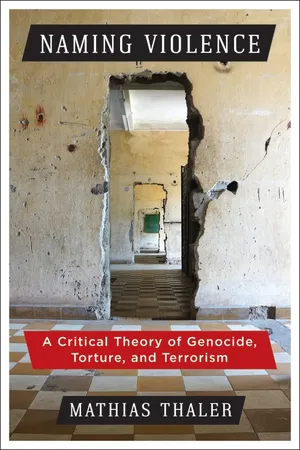
- English
- ePUB (mobile friendly)
- Available on iOS & Android
About this book
Much is at stake when we choose a word for a form of violence: whether a conflict is labeled civil war or genocide, whether we refer to "enhanced interrogation techniques" or to "torture," whether a person is called a "terrorist" or a "patriot." Do these decisions reflect the rigorous application of commonly accepted criteria, or are they determined by power structures and partisanship? How is the language we use for violence entangled with the fight against it?
In Naming Violence, Mathias Thaler articulates a novel perspective on the study of violence that demonstrates why the imagination matters for political theory. His analysis of the politics of naming charts a middle ground between moralism and realism, arguing that political theory ought to question whether our existing vocabulary enables us to properly identify, understand, and respond to violence. He explores how narrative art, thought experiments, and historical events can challenge and enlarge our existing ways of thinking about violence. Through storytelling, hypothetical situations, and genealogies, the imagination can help us see when definitions of violence need to be revisited by shedding new light on prevalent norms and uncovering the contingent history of ostensibly self-evident beliefs. Naming Violence demonstrates the importance of political theory to debates about violence across a number of different disciplines from film studies to history.
Frequently asked questions
- Essential is ideal for learners and professionals who enjoy exploring a wide range of subjects. Access the Essential Library with 800,000+ trusted titles and best-sellers across business, personal growth, and the humanities. Includes unlimited reading time and Standard Read Aloud voice.
- Complete: Perfect for advanced learners and researchers needing full, unrestricted access. Unlock 1.4M+ books across hundreds of subjects, including academic and specialized titles. The Complete Plan also includes advanced features like Premium Read Aloud and Research Assistant.
Please note we cannot support devices running on iOS 13 and Android 7 or earlier. Learn more about using the app.
Information
Table of contents
- Cover
- Series Statement
- Title Page
- Copyright
- Contents
- Acknowledgments
- 1. Political Theory Between Moralism and Realism
- 2. Telling Stories: On Art’s Role in Dispelling Genocide Blindness
- 3. How to Do Things with Hypotheticals: Assessing Thought Experiments About Torture
- 4. Genealogy as Critique: Problematizing Definitions of Terrorism
- 5. The Conceptual Tapestry of Political Violence
- Notes
- Bibliography
- Index
- Series List